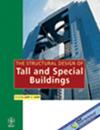协同使用超高性能纤维增强混凝土(UHPFRC)和碳纤维增强聚合物(CFRP)提高钢管混凝土的抗冲击性能
IF 1.8
3区 工程技术
Q3 CONSTRUCTION & BUILDING TECHNOLOGY
引用次数: 0
摘要
钢管混凝土因其施工速度快、人工需求少、材料成本合理等优点而受到越来越多的关注。在使用过程中,cfst可能会受到意想不到的冲击载荷,包括车辆和船只的碰撞,以及水和风带来的碎片撞击。这种极端荷载事件经常导致传统cfst部分或完全失效,危及依赖它们的整个结构系统的安全和性能。为了解决这个问题,目前的研究探索了如何利用两种先进的复合材料,包括超高性能纤维增强混凝土(UHPFRC)和碳纤维增强聚合物(CFRP),来提供优越的机械性能,并最大限度地减少cfst对冲击载荷的脆弱性。所考虑的复合材料适用于新建和现有的结构,其中普通强度混凝土可以用UHPFRC代替,而CFRP片材可以进一步加强cfst。为了获得更深入的见解,本研究开发了一个经过实验测试验证的计算框架。利用一组具有代表性的冲击情景,记录了冲击模拟过程中的各种响应措施,如内力和挠度,以及cfst吸收的能量。然后进一步扩展调查,以捕获与混凝土、碳纤维增强塑料和钢管相关的主要设计参数的影响。在此基础上,引入了能量吸收指标作为评价cfst在冲击荷载作用下性能的指标。本文章由计算机程序翻译,如有差异,请以英文原文为准。
Synergistic use of ultra‐high‐performance fiber‐reinforced concrete (UHPFRC) and carbon fiber‐reinforced polymer (CFRP) for improving the impact resistance of concrete‐filled steel tubes
Concrete‐filled steel tubes (CFSTs) have received growing attention, owing to their rapid construction, reduced labor requirement, and reasonable material cost. While in service, the CFSTs can be subjected to unexpected impact loads, originating from vehicle and vessel collision, as well as water‐ and wind‐borne debris impact. Such extreme loading events often cause a partial or complete failure of conventional CFSTs, risking the safety and performance of the entire structural systems that rely on them. To address this issue, the current study explores how two advanced composite materials, including ultra‐high‐performance fiber‐reinforced concrete (UHPFRC) and carbon fiber‐reinforced polymer (CFRP), can be utilized to provide superior mechanical properties and minimize the vulnerability of CFSTs to impact loads. The composite materials under consideration are appropriate for both new and existing structures, in which normal‐strength concrete can be replaced with UHPFRC, while CFRP sheets can further strengthen the CFSTs. For obtaining in‐depth insights, a computational framework validated with the experimental tests was developed in the current study. Using a set of representative impact scenarios, various response measures, such as internal forces and deflections, as well as the energy absorbed by the CFSTs, were recorded during impact simulations. The investigations were then further extended to capture the influence of the main design parameters related to concrete, CFRP, and steel tube. From the conducted investigations, an energy absorption index was introduced, as a measure to evaluate the performance of CFSTs under impact loads.
求助全文
通过发布文献求助,成功后即可免费获取论文全文。
去求助
来源期刊
CiteScore
5.30
自引率
4.20%
发文量
83
审稿时长
6-12 weeks
期刊介绍:
The Structural Design of Tall and Special Buildings provides structural engineers and contractors with a detailed written presentation of innovative structural engineering and construction practices for tall and special buildings. It also presents applied research on new materials or analysis methods that can directly benefit structural engineers involved in the design of tall and special buildings. The editor''s policy is to maintain a reasonable balance between papers from design engineers and from research workers so that the Journal will be useful to both groups. The problems in this field and their solutions are international in character and require a knowledge of several traditional disciplines and the Journal will reflect this.
The main subject of the Journal is the structural design and construction of tall and special buildings. The basic definition of a tall building, in the context of the Journal audience, is a structure that is equal to or greater than 50 meters (165 feet) in height, or 14 stories or greater. A special building is one with unique architectural or structural characteristics.
However, manuscripts dealing with chimneys, water towers, silos, cooling towers, and pools will generally not be considered for review. The journal will present papers on new innovative structural systems, materials and methods of analysis.

 求助内容:
求助内容: 应助结果提醒方式:
应助结果提醒方式:


